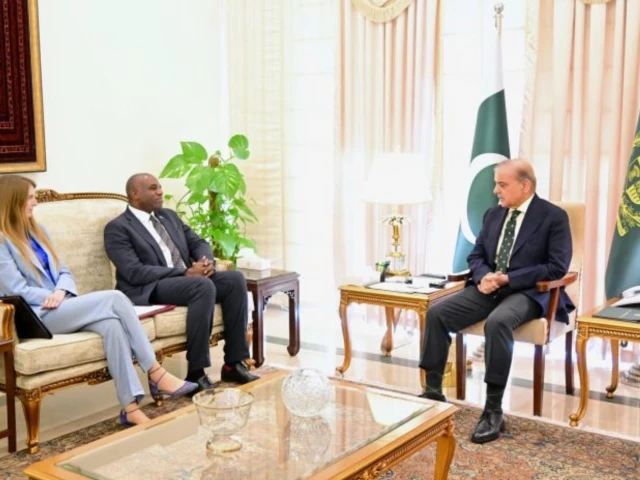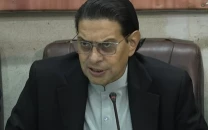UK foreign secretary welcomes Pakistan-India ceasefire, says conflict serves no one
David Lammy meets PM Shehbaz Sharif, Deputy PM Ishaq Dar during his first official visit to Pakistan.

British Foreign Secretary David Lammy hailed Pakistan and India for defusing tensions and agreeing to a ceasefire during meetings with Prime Minister Shehbaz Sharif and Deputy Prime Minister Ishaq Dar on his official visit to Islamabad while stating that “the conflict serves no one’s interest”.
Premier Sharif met Lammy on Friday at the Prime Minister’s House, expressing satisfaction with the positive momentum in Pakistan–UK relations and reaffirming his commitment to further enhancing bilateral cooperation across all sectors.
Reiterating Pakistan’s strong commitment to the ceasefire agreement, the PM noted that Pakistan had demonstrated immense patience and restraint in response to India’s baseless accusations and unprovoked aggression. He stressed that Pakistan’s actions in exercising its right to self-defence were both proportionate and targeted.
Highlighting Pakistan’s unwavering resolve to defend its sovereignty and territorial integrity at all costs, PM Sharif underscored the country’s enduring desire for peace in South Asia. He also extended his best wishes to His Majesty King Charles III and UK Prime Minister Keir Starmer.
Read more: Greatest honour is forcing enemy to ceasefire: PM marks Youm-e-Tashakur
This marks the first visit by a British foreign secretary to Pakistan since 2021. A statement from the British High Commission in Islamabad noted that Lammy welcomed the ceasefire, underscoring that peace and security form the foundation of the UK’s relationship with Pakistan.
Highlighting the importance of regional stability, Lammy praised efforts to end the long-standing hostility between Pakistan and India, calling the past few weeks “distressing.”
“The past few weeks have been difficult for British Pakistanis and British Indians alike. We particularly welcome the ceasefire between British Pakistanis and British Indians,” he added.
Referring to the heightened tensions after Pahalgam incident, he said the UK had made every effort to de-escalate the situation. “Both India and Pakistan have agreed to stop hostilities, and the ceasefire remains in place.”
Reaffirming the UK’s commitment to counter-terrorism efforts and ensuring the continuation of the ceasefire, Lammy highlighted the long-standing cooperation between the UK and Pakistan in promoting regional peace and stability.
Earlier, DPM Dar met with Lammy in Islamabad, warmly welcoming the ceasefire agreement between India and Pakistan, according to a statement from the Foreign Office.
Read more: Pakistan reaffirms support for China’s territorial integrity in Zangnan
Dar extended a cordial welcome to Lammy on his first official visit to Pakistan. The two leaders held detailed discussions on recent developments in South Asia, with a particular focus on the Pakistan–India ceasefire.
The DPM informed the British foreign secretary of India’s unprovoked and aggressive actions, condemning them as violations of Pakistan’s sovereignty, international law, the United Nations Charter, and the principles of interstate relations. He maintained that Pakistan had exercised its right to self-defence under Article 51 of the UN Charter.
According to the Foreign Office spokesperson, Dar appreciated the UK’s constructive and positive role in reducing tensions. Both sides stressed the importance of restraint and sustained dialogue to ensure long-term peace and stability in the region.
The meeting also addressed bilateral relations, with both parties expressing satisfaction over progress in trade, economic cooperation, and development partnerships. Dar lauded the UK’s valuable support in the fields of education, healthcare, and climate resilience.
Both leaders reaffirmed their commitment to enhancing cooperation in areas of mutual interest, including climate change and sustainable development.
They reiterated their resolve to strengthen the historic and long-standing ties between Pakistan and the UK, built on mutual respect, shared values, and strong people-to-people connections.
























COMMENTS
Comments are moderated and generally will be posted if they are on-topic and not abusive.
For more information, please see our Comments FAQ